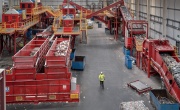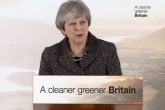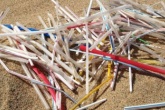Study claims plastic bag litter on UK ocean floor has fallen by a third
A new scientific study claims that the number of plastic bags on the ocean floor around the UK is dropping, which could be proof that the five pence plastic bag charge is having an effect.
 Since the five pence plastic bag charge was introduced in October 2015, take-up of single-use bags has decreased significantly in the UK. Data from the Department of Environment, Food and Rural Affairs (Defra) revealed that around 83 per cent (approximately six billion) fewer bags were sold by the UK’s main seven retailers (Asda, Marks and Spencer’s, Sainsbury, Tesco, the Co-operative Group, Waitrose and Morrisons) in 2016/17 compared to 2014.
Since the five pence plastic bag charge was introduced in October 2015, take-up of single-use bags has decreased significantly in the UK. Data from the Department of Environment, Food and Rural Affairs (Defra) revealed that around 83 per cent (approximately six billion) fewer bags were sold by the UK’s main seven retailers (Asda, Marks and Spencer’s, Sainsbury, Tesco, the Co-operative Group, Waitrose and Morrisons) in 2016/17 compared to 2014.
Now, a 25-year study from the Centre for Environment, Fisheries and Aquaculture Science (Cefas) has revealed that levels of plastic bags on the seafloor surrounding the UK have also dropped. Cefas conducted 29 surveys between 1992 and 2017 across the North Sea, the English Channel, the Celtic Sea and the Irish Sea, collecting information about the litter found by trawlers in order to draw up a picture of how marine litter is changing.
While the survey reveals no overall change in the amount of litter collected – and a higher amount of some specific types of fishing-related plastic litter, such as crates and fishing lines – there was a significant drop in plastic bag debris. Comparing pre-2010 and post-2010 levels, the percentage of trawls finding plastic bags dropped on average by around 32 per cent from around the time that most European countries began to implement charges on single-use plastic carrier bags.
Eunomia Research and Consulting reported in 2016 that 94 per cent of plastic entering the ocean ends up on the sea floor, meaning this new study reflects to a high degree the composition of ocean plastics more widely. Thomas Maes, lead author of the Cefas study, said the results reveal a direct positive effect of the UK’s plastic bag legislation and associated changes in public attitude towards plastics. He commented: “It is encouraging to see that efforts by all of society, whether the public, industry, NGOs or government to reduce plastic bags are having an effect.
“This research suggests that by working together we can reduce, reuse and recycle to tackle the marine litter problem… The fewer bags we use, the fewer we can lose, the fewer we can put into the environment.”
In its 25 Year Environment Plan the government promised to abolish the small shop exemption for the plastic bag charge, which currently enables retailers with fewer than 250 employees to keep giving out free bags, and evidence like the Cefas report could be used to encourage the adoption of further fiscal measures to tackle plastic pollution. The Chair of Parliament’s Environmental Audit Committee (EAC), Mary Creagh MP, has called on the government to “repeat the success of the five pence plastic bag charge” by introducing a ‘latte levy’ on disposable coffee cups.

As part of an inquiry into drinks packaging waste, the EAC recommended a 25 pence charge be added to single-use coffee cups, with Creagh stating: “Evidence to our inquiry demonstrated that charges work better than discounts for reducing the use of non-recyclable materials”.
The government has so far been loath to commit to a mandatory coffee cup charge, preferring to support voluntary commitments by retailers such as Starbucks, which is currently trialling a five pence coffee cup charge.
The picture for plastic bottles looks set to change, however, with Defra’s recent announcement that it will be introducing a deposit return scheme in England for plastic, metal and glass drinks containers, subject to the results of a consultation.
The Cefas study was published in Volume 630 of the Science of the Total Environment journal, and can be read in full on the ScienceDirect website. 







